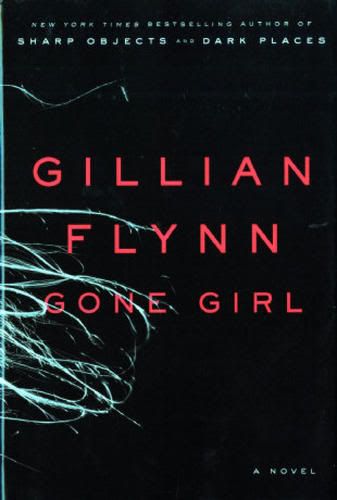Finally, a book that we can all agree on, a "sturdy trope turn[ed] inside out," the "literary sensation of summer 2012." Wait a minute, what kind of a thing is that to say? That's like saying, "Finally, a deck of cards that we can get behind!" Doesn't exist and/or make sense.
What I mean to say is: Finally, a mystery novel I've been both able to follow and enjoy. In fact, which drove me crazy trying not to understand and empathize with its strifling, lovelorn narrators so well. And to be honest, the first thriller I've read outside of The Hardy Boys and If You Give a Mouse a Cookie in some time. (The latter less a mystery than a kind of action-romp for kids.)
Who knew mysteries were so... mysterious? Not just in terms of who did what to whom, and why then on the sunroof, but for the bath they take in the discomfiting turned disarrayed insolubility of human nature. I feel like the last to discover guacamole or red wine, something good and good for you. What, you ask, is "good" about Flynn's story of an altogether troubled marriage, the composite of two well-adjusted otherwise, earnest, if distracted, young adults, which from our vantage point appears to end on the unjustly sour note of an abduction, brought about, or not, by five erratic year's worth of evenly ebullient and heartbroken entries in a diary, which serve not just to document Nick and Amy's time together, but provide exposition, shedding light and darkness, like a curtain, to their time apart; a time hard-fastened to our moment as a culture on the brink of disappearance? Not to mention that the present tense of Gone Girl takes place here in the Midwest, in the summer of 2012?? July to be exact??? I've no idea! But talk about suspense, eh!
Except to say, I felt myself implied, suspect even, not in the details like a swamp surrounding Amy's death or even in the sense that Nick's essentially incapable and (least as thrillers go) crime moves pretty slow outside Chicago, but as a writer as embroiled as the next guy in our century's obsession with that dirty word... No, not that one. Yikes! It's okay, you can stay, but hell.
That is, originality. (What did you think I was going to say? I recognized the drama of this novel as a mirror to my own life? And what would that book be? Colin and The Case of the Missing Lawn Chair... featuring Colin and his Accommodating Neighbors! Right.)
You see, the real conflict (and what makes Gone Girl the real-deal book of the summer, if not 2012), isn't that Amy's gone, but that everyone in Gone Girl is only partially present, in the sense that everyone, like Flynn, is a writer, more than willing to grant themselves the necessary distance between idea and reality. And thanks to the recession and its layoffs, ready, like a slip-and-slide in June, to reinvent themselves, even as Flynn tantalizingly points out how little left there is to say that hasn't already been said, or done, with what choice then but to bogart lives from movies and T.V. What choice, indeed!!! (Cue accommodating neighbors.)
Nick was once a journalist, Amy once a quiz-writer, though not to outdo Amy's parents, ever-present on the scene, but in another life bestselling author's of a children's series, starring Amy. Or rather, and not inconspicuously, a version of Amy. And so, we're never sure what Flynn, as a writer (as opposed to what? A Chicagoan? Blah!) is by-and-large enabling her characters to omit, and what her characters, in turn, are granting themselves the authority to invent.
And yet Nick, in particular, whose side of the story is by default the more spurious, seems most adamantly in search of "the genuine," or, to put it another way, most in-tune with his influences, ascending stairs in rhythm with the things he has to say, playing the "missing wife" game with himself inside the police station, and constantly in doubt of whether what he's feeling, and the authorities are doing, is based on his reality or how he always pictured it. To the point that we, as readers (last time, I promise), entertain that Nick is living a double life, not in secret or cahoots with alter-egos and those thieves behind the lawn chair, but as a kind of consequence of his confusing fact and fiction throughout his adult life.
The grief Nick's left with is real. His anger, too. But most notably his disbelief. All feelings that you'd think a man who claims to be underwhelmed by what's around him wouldn't have the heart to feel. And so it is at once a blessing and, of course, a tragedy that Amy's gone and Nick has done what he has done, whether that means that he's killed his wife or not, unable as he was before to experience the beauty of his marriage, without the aid of harm; the truth of his experience, without deceit; himself without himself.



1 comment:
Also? Check out Jack White's song Love Interruption and see if you don't think that would be a perfect theme song for the movie (I hear there's going to be a movie).
Post a Comment